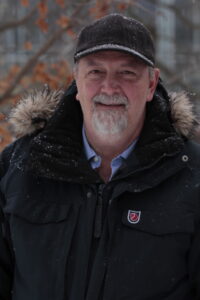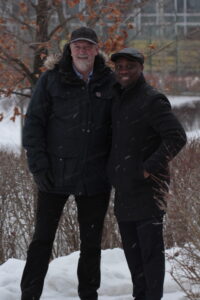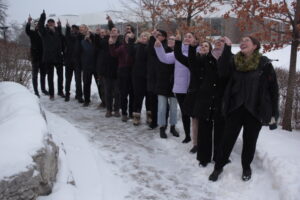
John Hirdes, a UW professor and alumnus, was appointed to the Order of Canada on Dec. 28. The appointment recognizes Canadians whose contributions “reverberate in communities across the country and beyond.”
The Elora resident was one of 78 new appointees announced by Governor General Mary Simon.
“What’s been an important part of my life is that I was a first-generation immigrant – I came here when I was six years old,” Hirdes said. “After all that time, being recognized as having done something positive for the country that adopted me is pretty great.”
Born to Dutch parents who lived in South West Africa (now Namibia) during the height of apartheid, Hirdes and his family immigrated to Canada around 1966.
Over the course of a nearly 35-year career, Hirdes was recognized as a fellow with the Royal Canadian Society, obtained the Queen Elizabeth II Diamond Jubilee Medal, and is the Canadian lead of InterRAI, a scientific network of about 140 researchers in 40 countries. He currently teaches in the School of Public Health Sciences.
His research contributed to screening systems that have helped more than six million Canadians be screened 21 million times to improve their quality of life. The systems are standard in nearly every province and territory across Canada.
“For example, if you have a relative that needs homecare services – at a first level, there will be an intake screen that homecare staff use to identify people with complex needs, based on cognitive impairment, physical disability, depression symptoms, caregiver distress,” Hirdes explained. The second assessment would be conducted by a case manager, who would then use that information to allocate homecare services, evaluate the quality of care, or for funding purposes.
Hirdes holds a bachelor of science in health studies, a master’s in sociology, a PhD in sociology, and a diploma in gerontology.
“The university environment, all through my career, has been supportive and has really helped me to achieve things in research that I do think would have been difficult to achieve in other university settings,” Hirdes said. “I think we’ve got something really unique and powerful here at Waterloo that’s really helpful for doing groundbreaking research.”
He said that his time as a UW student, particularly in the co-op program, helped to set the stage in his career.
“All of the research I’ve done as a scientist after my PhD have links back to my experience as a co-op student,” Hirdes said. “Those co-op jobs helped me build my CV as an undergrad student but also influenced my entire career as a researcher as something to draw from. I wouldn’t have thought it then, but co-op played a huge role in my ability to do applied research.”
One co-op job allowed him to work with children with mental health needs in juvenile detention centres, which later inspired him to do research in the corrections systems. At this co-op, he met his Ph.D. supervisor, Dr. Bill Forbes, the founding Director of the Gerontology program at UW.
Dr. Forbes connected him with Freeport Hospital in Kitchener, which got Hirdes interested in long-term care and ultimately got him involved in his work with InterRAI.
“He is a professor who valued the idea of universities working with stakeholders in the community,” Hirdes said. “That’s something that I’ve taken on in my role as a mentor. All of my graduate students are, in one way or another, involved in real, on-the-ground research in the healthcare systems.”
Hirdes has supervised the completion of nearly 80 Master’s and PhDs. “The students that we get at Waterloo are fantastic students. Throughout my career, it’s been amazing to work with undergrad students and graduate students that I know are going to have a big impact out there in the world. I’m lucky to be a professor here because of the quality of students that we get.”
































